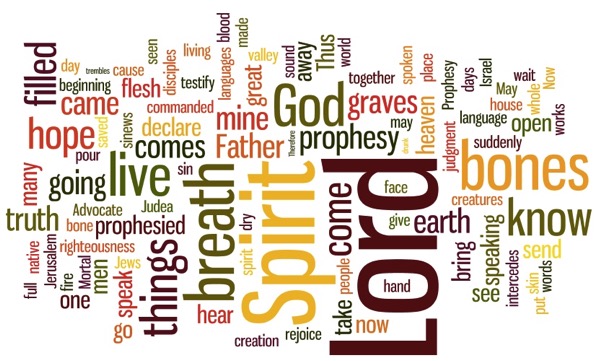Day of Pentecost, May 24
New atheists have enjoyed more than a decade in the spotlight, especially since the terrorist strikes of September 2001. But new atheists offer nothing new in one realm: the idea of miracles. Like Clarence Darrow, they compile damning lists of every biblical passage in which nature defies the laws of nature. Then they conclude that only fools could possibly take the Bible as anything more than a collection of tales told by so many idiots, full of sound and fury, signifying nothing.
| Acts 2:1-21 or Ezek. 37:1-14 Ps. 104:25-35, 37 Rom. 8:22-27 or Acts 2:1-21 John 15:26-27; 16:4b-15 |
They miss the crucial link in the chain of miracles: the same God who set the world in motion and established the laws of nature has the power to suspend those laws for a higher purpose. If the universe is but a clockwork mechanism, it’s a logical assumption that people do not speak clearly in languages they have never heard. But the God who created the diversity of human language as an act of mercy (Gen. 11:7-9) gives a miraculous and momentary gift of diverse fluency to the nascent Church gathered in worship. This is, again, an act of mercy and redemption, and it occurs simply because God wills it and sends the Holy Spirit in power.
The psalmist notices Leviathan, which God “made for the sport of it.” Why should we shrink from detecting divine playfulness in leaping dolphins, honking geese, or even the painterly swirls in the markings of a domestic cat?
The Holy Spirit is the mysterious presence in each of this day’s readings. The Spirit gives the early Christians fluency in another language, but also gives divine groans to a Christian in such distress that coherent prayer seems impossible. Pop musician Van Morrison has sung about “Inarticulate Speech of the Heart,” and many Christians who have spent time in concentrated prayer will resonate with that phrase.
God sends us the Spirit not only to comfort us but to draw others closer to the kingdom of heaven. The Holy Spirit may prompt us to take an action that makes no sense. Earlier this month we heard of the Spirit prompting Philip to run up to a chariot carrying an Ethiopian eunuch, and how this encounter soon led to baptism. Spend time talking with Christians in Global South nations, where Enlightenment prejudices have not squelched awareness of the supernatural, and you will hear similar accounts of the Spirit showing up — inexplicably, beyond mere logic, with a rationale that transcends our own.
This is not merely a case of God doing parlor tricks. It is God intervening in the affairs of the created order, intruding in the world he created, to gain our attention and to woo us into a redeemed life.
We can turn to ridicule and scoffing, like the disbelieving crowd described in Acts. We can be angry with God for not playing by his own rules, or (more precisely) what we understand of those rules, which is always subject to improvement. Or we can ask honest questions of ourselves about what has happened in front of our eyes and ears, and what God asks of us in response.
Look It Up
Read Job 38.
Think About It
When you have been troubled by evil or suffering, have you thought that God could show greater concern for the world? What biblical themes help counter that feeling?
 TLC on Facebook ¶ TLC on Twitter ¶ TLC’s feed ¶ TLC’s weblog, Covenant ¶ Subscribe
TLC on Facebook ¶ TLC on Twitter ¶ TLC’s feed ¶ TLC’s weblog, Covenant ¶ Subscribe









